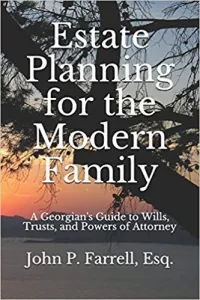
Canton Estate Planning

Canton Estate Planning
The Farrell Law Firm is dedicated to providing Canton residents with tailor-made Wills, Trusts, and Powers of Attorney. Selecting a Canton Estate Planning attorney could be one of the most important decisions you make. The right lawyer can mean the difference between a successful distribution of your estate and significant loss of your estate to probate lawyer fees.
Estate Planning Author and Speaker
By working with an attorney who regularly writes or speaks about estate planning, you'll see an attorney who is on top of changes in estate planning laws. As an example, I've written a couple of different books on estate planning. One is tailored for a Georgia audience and is titled: Estate Planning for the Modern Family: A Georgian's guide to Wills, Trusts, and Powers of Attorney. The other is similarly named and ranked as a # 1 new release on Amazon. Additionally, I routinely hold seminars to educate the public on important estate planning topics such as how to protect your home and family from the Probate Court.







